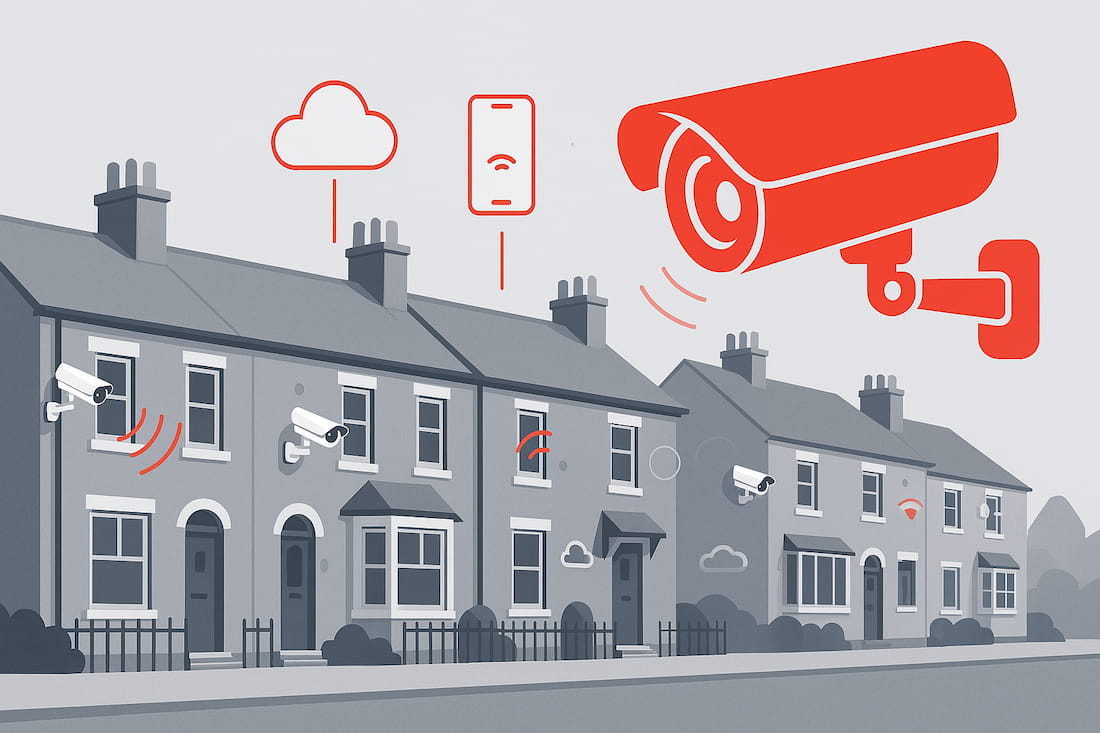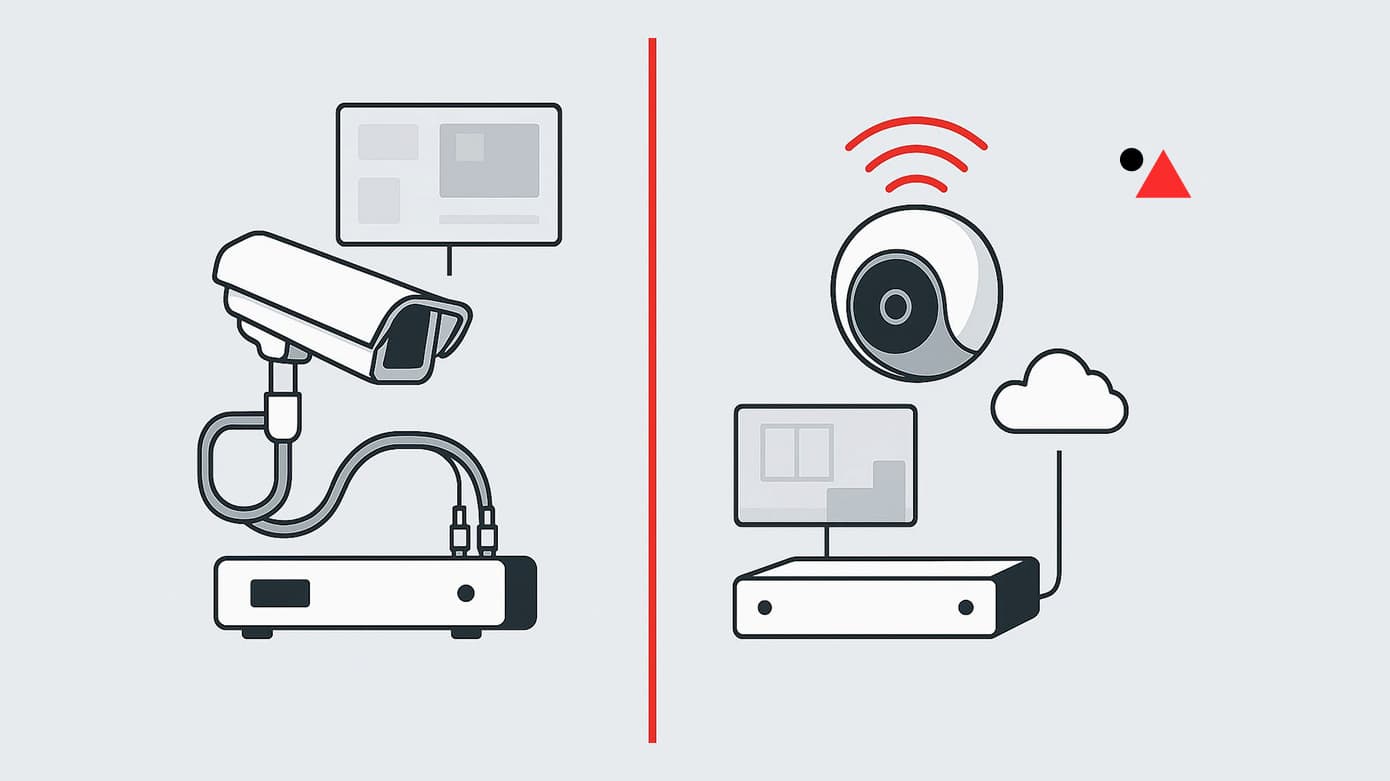Introduction
In a world where people feel uncertain, it’s very important to keep our homes safe, especially at entry points. CCTV camera systems are key for this. They can help stop crime, monitor our properties, and give homeowners peace of mind. This guide will look at the differences between analog and IP CCTV systems in Newcastle. It will help you make good decisions to improve your home’s security.
Understanding CCTV Systems in Newcastle

Closed-circuit television, or CCTV, systems have changed a lot over the years. They now come with many new features to help with different security needs. Knowing the differences between the old analog systems and the modern IP-based systems is important. This information can help you choose the best option for your home in Newcastle.
Learning about analog and IP CCTV systems is important. This knowledge helps you protect your property. It also keeps your loved ones safe.
Overview of Analog CCTV Systems
Analog CCTV systems, known as traditional CCTV systems, have played a key role in security for many years. These systems use analog cameras to capture video footage. The cameras send the video signal through coaxial cables to a video recorder, or DVR. The DVR records and compresses the video footage, storing it on hard drives. This makes it easy for you to access the video recording later.
Analog CCTV systems typically provide video quality of about 720p. This level of quality is enough for basic security needs. However, it lacks the clarity that higher-resolution IP systems can provide. Additionally, analog cameras struggle in low light. As a result, the video can appear grainy or unclear.
Many people still prefer using analog video surveillance systems, despite their problems. Homeowners often pick them because they are affordable. This is because they offer reliable and easy security solutions.
Benefits of IP CCTV Systems
IP CCTV systems improve surveillance technology a lot. IP cameras capture video footage in a digital format. They share this footage through a network. You can connect to a Network Video Recorder (NVR) using wireless methods or Ethernet cables.
One big advantage of IP CCTV systems is their excellent image quality. They can take megapixel images. IP cameras come in several resolutions, like high-definition (HD) and ultra HD cameras. You can even find wireless CCTV cameras that are ultra HD. This means you get clear videos with many details, which helps in identification. Also, wireless systems cut down on cables. This makes installation easier and gives you more options for where to place the cameras.
IP video surveillance systems come with several smart features. You can view them from any location. They also send alerts when they detect movement. These systems can link up with other smart home devices, including PTZ cameras. This makes them a perfect choice for homeowners who want complete security solutions.
Choosing the Right CCTV System for Your Home
Choosing the right security cameras and video surveillance system for your home or Newcastle property is really important for safety. A good choice can help protect your space better. Think about your needs, your budget, and the features you want. This will help you make a decision that suits you well.
You can pick the cheaper analog system or choose the better IP system. If you learn the benefits and downsides of both, you can create a strong security system for your home.
Factors to Consider When Choosing CCTV
Start by thinking about your security needs. Do you only want simple cameras to prevent problems? Or do you need special features like facial recognition? This is the best way to improve security. You might also want cameras that can take pictures of license plates.
When you want to get a CCTV system, the first thing to think about is your budget. There are many CCTV systems at different prices. Start by deciding how much money you can spend. Then, look at various options that fit your budget. Don’t forget to consider installation costs, ongoing maintenance, and any extra fees for cloud storage that may come up.
Installation Complexity: Consider how difficult it will be to set everything up. Analog systems often need several cables. This can create a mess and take a lot of time to connect. In contrast, wireless IP systems are simpler to install. However, they might not work well if the distance is too long or there is too much interference.
Comparison Between Analog and IP Systems
To help you see the differences between analog and IP CCTV systems, here is a table with important features:
| Feature | Analog CCTV | IP CCTV |
|---|---|---|
| Image Quality | Standard (e.g., 720p) | High-Definition (e.g., 1080p, 4K) |
| Scalability | Limited | Highly Scalable |
| Cost | Lower Initial Cost | Higher Initial Cost |
| Cabling | Coaxial Cables Required | Wireless or Ethernet Options |
| Remote Access | Typically Not Available | Usually Available |
| Advanced Features | Limited | Wide Range of Features |
Analog systems are a good choice because you can keep your videos stored right where they are used. They usually cost less money. On the other hand, IP systems give clearer images. They are simple to upgrade. These systems also have added features, such as the ability to access them from a distance.
The best choice will depend on your needs. Spend some time thinking about the pros and cons. This way, you can make a smart decision that fits your security needs and budget.
Installation Process for CCTV Systems in Newcastle Homes
Setting up a video surveillance system can change based on whether you choose analog or IP systems. The layout of your home in Newcastle is also important. It’s a good idea to hire expert CCTV installers for the job. They will ensure that the cameras are positioned correctly, the system is set up properly, and that everything works well.
These skilled technicians will check your property. They will recommend the best help places for the cameras. They will also handle the wiring and set up the network. You can trust Alert Pro to do an excellent job with our CCTV services. This will make your CCTV system better. It will also help you avoid problems and stay within UK privacy laws.
Steps Involved in Installing Analog Systems
Installing a video surveillance system includes several key steps. First, CCTV installers will choose the best places for the cameras and the DVR. They will consider your needs and the layout of your property. Next, they will run cables from the cameras to the DVR. They will also make an effort to conceal these cables for a neat appearance.
After the wiring is complete, the installers will place the cameras in the ideal spots. They will ensure that the cameras are set up correctly to capture clear images. Next, they will connect the cameras to the DVR and organize the entire system. This setup will include recording schedules, areas for motion detection, and may allow for remote viewing if possible.
The installers will look over everything at the end. They need to ensure all the cameras work well and that the recordings save correctly. A good installation by skilled experts helps your CCTV system perform at its best.
Key Considerations for IP System Installation
Installing a video surveillance system with IP cameras includes a few steps. First, you need to set up your network. After that, give IP addresses to each device. It’s also important to consider where the data will be stored. Make sure your home network has enough bandwidth. This will help it manage the video streams coming from your IP cameras.
Next, give each camera on your network a unique IP address. You can do this manually or let your network’s DHCP take care of it. It is important to set the IP addresses correctly. This way, the cameras can talk to each other and you can access them from various locations.
You have to decide how to keep your recordings. IP systems let you store them on your device with an NVR or in the cloud for a fee. Each choice has its good and bad points. This can include factors like storage space, ease of use, and cost.
Advanced Features of Modern CCTV Systems
Modern CCTV systems do a lot more than watch over things. The use of CCTV cameras includes many new features that make security easier and better. This gives us peace of mind. Features like remote access, mobile monitoring, motion detection alerts, and night vision have changed the way we protect our homes and our loved ones.
Thanks to these changes, homeowners can now understand and take care of their properties better. They can keep a close eye on their homes. This allows them to respond quickly to security threats, no matter where they are.
Remote Access and Mobile Monitoring
One big benefit of today’s CCTV systems is how easy it is to access them. Homeowners can watch live video from their cameras using mobile apps. If they have internet access, they can look at their cameras from almost anywhere.
Looking at your property and commercial properties from afar can give you peace of mind. With over 13 years of experience in security services, you can keep an eye on your home while you are on vacation, at work, or just going out. Many security systems can send you alerts in real time. We also offer free site surveys. You can receive push notifications or emails for events like motion detection or tampering.
These alerts help you stay informed about safety issues. This lets you respond fast, reach out to the authorities, or see how things progress.
Motion Detection and Alerts
Motion detection is a key feature in many modern CCTV systems. It helps add extra security to your home. Cameras might have motion sensors. These sensors can be built-in or separate. They detect any movement nearby. If they see something that could be a break-in, they will send you alerts.
When motion sensors detect movement, the system can quickly notify your smartphone or email. This keeps you informed about unusual activities, even when you are not at home. You can change the sensitivity of the motion detection. This can help prevent false alarms caused by pets, swaying trees, or everyday actions.
This special way of watching movement helps you get helpful alerts. It allows you to react quickly to possible security issues and reduces annoying interruptions.
Night Vision Capabilities
Seeing your home at night is important for your safety. Hikvision ColorVu cameras help you do this easily. Many night vision CCTV cameras now have extra features. These features allow them to record clear videos in low light or total darkness settings.
These cameras use infrared (IR) LEDs. They send out invisible light. This light makes the area brighter. The IR light bounces off objects. This helps the cameras take clear black-and-white pictures, even when regular cameras can’t.
Night vision technology makes sure that your CCTV system is always prepared. It can help prevent crime and provide important evidence if something occurs.
Legal Considerations and Privacy Laws
Installing a good CCTV installation services system in your home or in nearby industrial areas in Newcastle can really improve security. It is important to know UK laws and privacy rules about surveillance. When you follow these rules, you help protect everyone’s privacy. This practice can also make your CCTV installation more effective.
Understanding UK CCTV Regulations
The use of CCTV systems in the UK must follow rules set by the General Data Protection Regulation (GDPR) and the Data Protection Act 2018. These laws show how to handle personal data gathered by these surveillance systems.
Some key points about GDPR are that collecting data must be legal, fair, and easy to understand. Homeowners need a valid reason for using CCTV, such as home security or preventing crime. They also have to place clear signs to inform people that CCTV is in use.
Homeowners must decide how long to keep CCTV footage. It’s essential to save the video only for the time you truly need it. By doing this, homeowners can use CCTV footage in a legal and responsible way.
Balancing Security with Privacy in Newcastle
When you use CCTV systems, it’s important to find a balance between security and privacy. This is very important in Newcastle, where people value their rights. You should try not to point cameras at public spaces or near homes. This can make it hard to cover much area well.
If your CCTV system records video outside your property, like on a public sidewalk, you need to follow data protection laws. This means you must get permission to record. You also have to let people know why you are watching that area.
Doing a privacy impact assessment can help you find and lessen privacy risks that come from your CCTV system. By considering why and how you monitor, you can keep strong security measures in place. This practice shows that you respect people’s rights and follow UK rules.
Maintenance and Upkeep of CCTV Systems
Taking care of your CCTV system is key to making sure it works well for a long time. If you follow a few easy maintenance steps, you can help protect your investment and your property.
If you include these habits in your daily routine, your CCTV system can remain in great shape. This will help it protect well and keep your surveillance footage safe.
Routine Maintenance Tips
To keep your CCTV system running smoothly, try these maintenance tips:
Lens Cleaning: You should clean your camera lenses often. Use a soft cloth that does not leave lint behind. A good lens cleaning solution will help too. Dust and dirt can build up on the lenses. This makes it difficult to see clearly and reduces the quality of your images.
Software Updates: You need to check your cameras, DVR/NVR, and mobile apps for updates regularly. It’s important to install these updates. They can solve problems, improve your system’s safety, and enhance performance.
System Audits: It is important to carry out regular system audits. They help you check if all the cameras are working well, if the recordings are saved correctly, and if the network is stable. Audits help you find problems early. By doing this, you can fix issues fast and reduce downtime.
Troubleshooting Common Issues
Having problems with your CCTV system can be annoying. But there is no need to fret. Many usual issues have easy fixes that you can attempt.
Signal Loss: If some cameras are not getting a signal, look at the cable connections. Make sure the cables fit tightly and are in good condition for analog systems. For IP systems, check the network connection. Also, ensure the power adapters are connected correctly and functioning properly.
Fuzzy Images: Blurry pictures can occur if the camera lens is dirty. You can fix this by cleaning the lens. Instructions for this can be found in the maintenance section. If cleaning does not help, look at the camera settings. You may need to adjust the resolution and focus.
System Reboots: If your system shuts down or restarts unexpectedly, you should check the power supply. It needs to meet your system’s requirements. Overheating can also cause these problems. Make sure there is good airflow around the DVR or NVR.
Conclusion
In conclusion, picking the right type of CCTV camera system for your home in Newcastle is very important for your safety. You should learn about each system, including their light sources, costs, installation, legal needs, and maintenance. Modern CCTV systems have great features like night vision, remote access, and motion detection. These features can make you feel safer. It’s also important to know the UK CCTV rules. You need to find a balance between security and privacy. This will help you make a good choice to protect your home. Make sure to choose a reliable CCTV system that fits your needs.
Frequently Asked Questions
What are the cost implications of installing an IP CCTV system?
IP CCTV systems cost more to install compared to analog systems initially. However, you can save money in the long run. This is due to lower maintenance costs. Plus, you won’t need to upgrade the equipment as often.
How can I ensure my CCTV system complies with UK privacy laws?
To follow GDPR rules, you need to clearly explain how you use data. Keep the data only as long as you need it. Only record video footage when it is necessary. If you manage a lot of personal data, think about hiring a data protection officer. Also, remember to check your system regularly.

